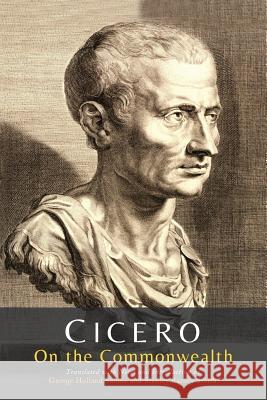On the Commonwealth » książka
On the Commonwealth
ISBN-13: 9781614279266 / Angielski / Miękka / 2016 / 292 str.
2016 Reprint of the 1929 edition. Full facsimile of the original edition, not reproduced with Optical Recognition Software. "On the Commonwealth" is a dialogue on Roman politics by Cicero, written in six books between 54 and 51 BC. It is written in the format of a Socratic dialogue in which Scipio Africanus Minor (who had died a few decades before Cicero was born, several centuries after Socrates' death) takes the role of a wise old man - a typical feature of the genre. Cicero's treatise was politically controversial: by choosing the format of a philosophical dialogue he avoided naming his political adversaries directly. By employing various speakers to raise differing opinions, Cicero not only remained true to his favored skeptical method of setting opposing arguments against one another (see, e.g., Carneades), but also made it more difficult for his adversaries to take him to task on what he had written. Book one: Contains a discussion between the protagonists of the political situation of their time. The theme of the work is given and some comments are made about the theory of constitutions. Book two: An outline of Roman history and the development of the constitution. Book three: The role of justice in government is examined, as are the different types of constitutions. Book four: A discourse about education. Book five: The characters converse about the qualities of the ideal citizen in government. Book Six: Little of this book survives except the Somnium Scipionis, which functions as the conclusion to the work.
2016 Reprint of the 1929 edition. Full facsimile of the original edition, not reproduced with Optical Recognition Software. "On the Commonwealth" is a dialogue on Roman politics by Cicero, written in six books between 54 and 51 BC. It is written in the format of a Socratic dialogue in which Scipio Africanus Minor (who had died a few decades before Cicero was born, several centuries after Socrates death) takes the role of a wise old man - a typical feature of the genre. Ciceros treatise was politically controversial: by choosing the format of a philosophical dialogue he avoided naming his political adversaries directly. By employing various speakers to raise differing opinions, Cicero not only remained true to his favored skeptical method of setting opposing arguments against one another (see, e.g., Carneades), but also made it more difficult for his adversaries to take him to task on what he had written. Book one: Contains a discussion between the protagonists of the political situation of their time. The theme of the work is given and some comments are made about the theory of constitutions.Book two: An outline of Roman history and the development of the constitution.Book three: The role of justice in government is examined, as are the different types of constitutions.Book four: A discourse about education.Book five: The characters converse about the qualities of the ideal citizen in government.Book Six: Little of this book survives except the Somnium Scipionis, which functions as the conclusion to the work.











